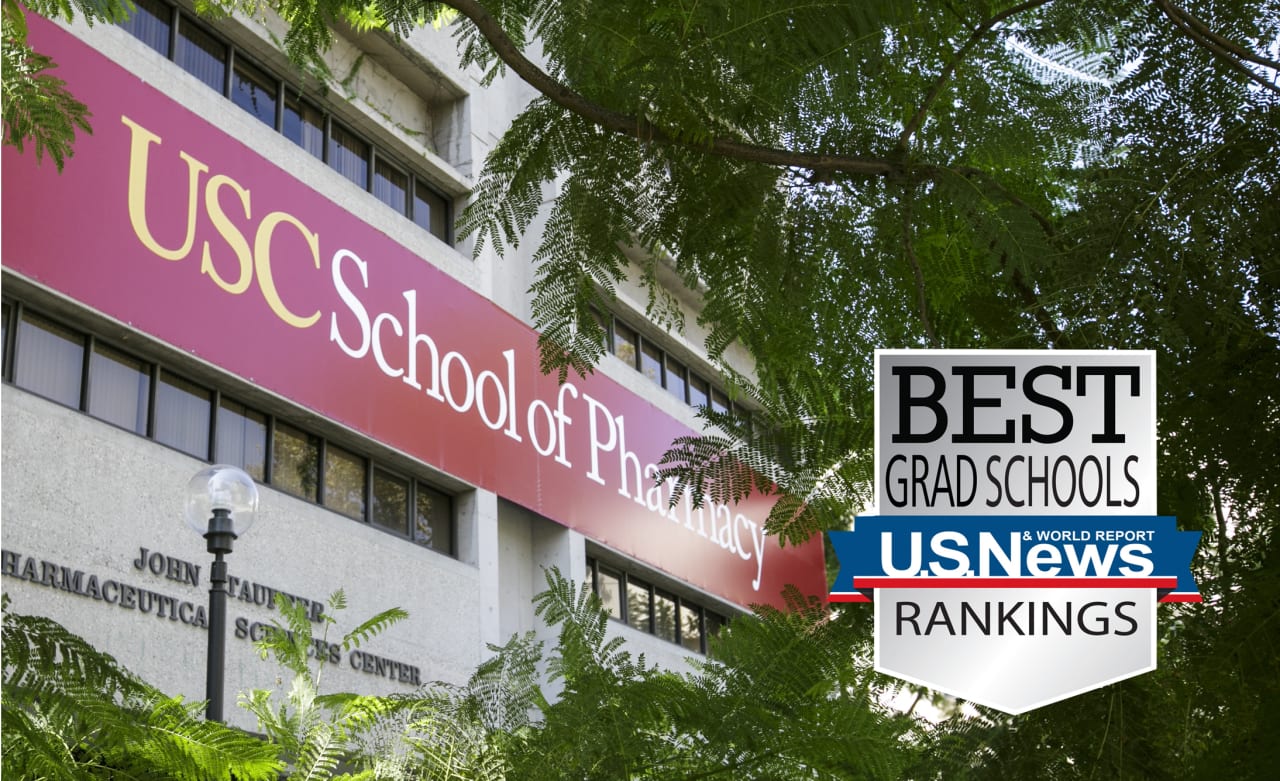
Doctor of Pharmacy (PharmD)
USC Alfred E. Mann School of Pharmacy and Pharmaceutical Sciences

Key Information
Campus location
Los Angeles, USA
Languages
English
Study format
On-Campus
Duration
4 years
Pace
Full time
Tuition fees
USD 64,632 / per year
Application deadline
Request info
Earliest start date
Request info
Introduction
Earning Your PharmD at USC
We established the world’s first Doctor of Pharmacy (PharmD) and remain a trendsetter in enabling future pharmacists to serve patients and communities at the profession’s highest standards.
Earning your PharmD at USC prepares you for leadership in the field—no matter which area of practice you choose. We continually refresh our curriculum with new courses that reflect the pharmacist’s importance as a frontline healthcare provider.
Your PharmD Path
During our innovative, four-year PharmD program, you will enroll in 15 to 18 units each semester. The first three years combine rigorous courses in the biomedical, clinical pharmaceutical, and social-administrative sciences with Introductory Pharmacy Practice Experiences.
The fourth year focuses on Advanced Pharmacy Practice Experiences in settings throughout greater Los Angeles and beyond, as well as a capstone project that further expands your expertise to launch your career.
At all stages, you will be mentored by an internationally renowned faculty dedicated to fostering the next generation of pharmacy leaders.

Admissions
Curriculum
Areas of Concentration
The PharmD curriculum offers six areas of concentration:
- Comprehensive Medication Management and High-Risk Populations
- Education
- Health Systems and Care Management
- Pharmaceutical Industry
- Pharmacy Entrepreneurship
- Research
Twelve units are required for each area of concentration and can be completed as part of the regular PharmD curriculum.
To pursue an area of concentration, you must:
- Have completed your first year in the PharmD program
- Maintain a minimum cumulative GPA of 3.0
- Formally apply online
Curriculum
The PharmD curriculum is a four-year combination of required and elective courses. Students are generally enrolled in 11-19 units each semester. The sample curriculum outlined below provides an overview of the current PharmD curriculum.
Foundational courses in the biomedical, pharmaceutical, social-administrative, and clinical sciences comprise the first three years of the program. Students complete Introductory Pharmacy Practice Experiences (IPPE) along with classroom-based courses. The end of the third year and final (fourth) year of the program includes the Advanced Pharmacy Practice Experiences (APPE), which are set in healthcare settings throughout the greater Los Angeles area, along with a capstone course.
The School’s Curriculum Committee continuously reviews and enhances the curriculum to ensure students develop the competencies essential to the pharmacist’s expanding role as a healthcare provider. Curriculum changes also reflect scientific advances, population profile changes, increasing health expectations, technological advances, the increasing role of the government in health services, and other influences.
Areas of Concentration
The USC Alfred E. School of Pharmacy and Pharmaceutical Sciences is pleased to offer six areas of concentration within the PharmD curriculum:
Comprehensive Medication Management and High-Risk Populations
Didactic Courses (6 units):
- PHRD 655: Geriatric Pharmacy I (3 units)
- PHRD 656: Geriatric Pharmacy II (3 units)
- PHRD 628: Interprofessional Collaboration (3 units with longitudinal 2-year IPE experience)
- PHRD 680 – Cannabis User Safety (2 units)
Experiential Courses (6 units):
- PHRD 731: Advanced Geriatrics APPE (6 units)
- PHRD 750: Advanced Pharmacy Practice Elective (APPE) (6 units, maximum 18)
Education
Education
- PHRD 555: Pharmacy Education I (2 units)
- PHRD 556: Pharmacy Education II (1 unit)
- PHRD 671: Pharmacy Education Seminar (3 units)
Experiential Courses (6 units):
- PHRD 751: Non-Traditional Advanced Pharmacy Elective (APPE) (6 units)
Health Systems and Care Management
Didactic Courses (6 units):
- PHRD 653: Health Systems Pharmacy I (3 units)
- PHRD 670: Marketing and Development in the Pharmaceutical Industry (3 units)
- MPTX 510/PHRD 678: Topics in Pharmacology: The Other Side of Drugs (3 units)
- PHRD 654: Acute Care II (3 units)
- PHRD 674: Acute Care I (3 units)
Experiential Courses (6 units):
- PHRD 750: Advanced Pharmacy Practice Elective (APPE) (6 units, maximum 18)
- PHRD 751: Non-traditional Advanced Pharmacy Elective (APPE) (6 units)
Pharmaceutical Industry
Didactic Courses (6 units):
- PHRD 663 – Pharmaceutical Development (3 units)
- PHRD 670 – Marketing and Development in the Pharmaceutical Industry (3 units)
- MPTX 511 – Introduction to Medical Product Regulation (3 units)
- MPTX 512 – Regulation of Pharmaceutical and Biological Products (3 units)
- HCDA 501– Fundamentals of Healthcare Insurance Design (3 units)
- HCDA 506 – Foundations of Insurance and Global Access (3 units)
- HCDA 507 – Foundations of Product Development and Commercialization (3 units)
Experiential Courses (6 units):
- PHRD 738 – Pharmaceutical Industry APPE (6 units)
- PHRD 751: Non-traditional Advanced Pharmacy Elective (APPE) (6 units)
Pharmacy Entrepreneurship
Didactic Courses (6 units):
- PHRD 651: Community Pharmacy and Business Management I (3 units)
- PHRD 652: Community Pharmacy and Business Management II (3 units)
- PHRD 663: Pharmaceutical Development (3 units)
- PHRD 673: Spanish for Pharmacists (3 units)
Experiential Courses (6 units):
- PHRD 750: Advanced Pharmacy Practice Elective (APPE) (6 units, max 18)
- PHRD 751: Non-traditional Advanced Pharmacy Elective (APPE) (6 units)
Research
Didactic Courses (6 units):
- PHRD 657L: Basic Research Design (3 units, maximum 6)
- PHRD 790: Directed Research (1-12 units, maximum 12)
Experiential Courses (6 units):
- PHRD 750: Advanced Pharmacy Practice Elective (APPE) (6 units, maximum18)
- PHRD 751: Non-traditional Advanced Pharmacy Elective (APPE) (6 units)
Twelve units will be required for each area of concentration and can be completed as part of the regular PharmD curriculum.
Scholarships and Funding
USC and the USC Mann School of Pharmacy and Pharmaceutical Sciences award a variety of scholarships each year to new and continuing students based on academic performance, extracurricular activities, pharmacy interest, and/or financial need.
USC Mann School of Pharmacy and Pharmaceutical Sciences Institutional and Endowed Scholarships
Donor-based scholarships are based on leadership, class level, community service, career interest, and academic achievement. Scholarships and funds are also awarded by USC Mann to some of the top-tier students. Scholarships and funds are not awarded to all students and are provided at the discretion of the Scholarship Awards Committee based on factors related to the student's application, donor criteria, interview performance, materials provided, communication, financial circumstances, and strength of the overall holistic review. Some areas of focus include:
- Students achieving top academic performance
- Underrepresented students to support our commitment to diversity, equity, and inclusion
- Out-of-state and international students to enrich our culture and community
New students seeking scholarships will be reviewed upon acceptance using all materials and communications during the admission process, including your PharmCAS application as well as your interview performance. There is no other scholarship application for new students.
Current students should complete the scholarship profile annually each spring, which will be used by the Scholarship Awards Committee to make scholarship recommendations.
Over 3.5 million dollars in scholarships are provided to PharmD students.
Applying for USC University Sponsored and Outside Scholarships
There is a wide variety of scholarship awards that you can apply for. Many are specifically for graduate and professional students. It’s a good idea to prepare a scholarship template that you can adjust depending on the type of scholarship you may be applying for. This allows you to occasionally review these lists and send out applications quickly. Here are the websites to outside scholarships:
- iGrad
- CollegeNET
- Fastweb
- Scholarships.com
- USC Scholarship Universe
Gallery
Career Opportunities
Numerous career options await our graduates, who are superbly trained experts in research, policy, community care, and clinical practice. According to a report from the financial company SoFi, Trojan pharmacy graduates rank No. 4 in the nation for the highest average salary in the field.
Here are just a few of the many career options available to you with a PharmD degree from the USC Alfred E. Mann School of Pharmacy and Pharmaceutical Sciences.
Clinical Pharmacy Practice
In many clinics that serve diverse populations, pharmacists are integral members of the healthcare team whose contributions optimize cost-effective patient care. Working in partnership with physicians, pharmacists increasingly assume responsibility for medication therapy management—especially for patients with chronic diseases such as diabetes, asthma, and high blood pressure—and help patients achieve optimal outcomes through appropriate medication, diet, and lifestyle choices.
Community Pharmacy
Community pharmacists serve on the front lines of healthcare. In addition to dispensing medications and monitoring patients for adverse effects and drug interactions, pharmacists provide important counseling services, such as the proper selection of over-the-counter medications and referrals to other healthcare providers. Today’s pharmacists are also versed in alternative medicines. Many USC graduates own independent pharmacies or have advanced to management positions within retail chain pharmacy organizations.
Geriatric Pharmacy
Nearly 40% of the U.S. population are mature adults who consume a large proportion of healthcare resources. Our PharmD graduates are among the nation’s leaders in geriatric pharmacy. Careers in this field serve the needs of a fast-growing segment.
Governmental Agencies
Local, state, and federal government agencies—such as the National Institutes of Health, Food and Drug Administration, Veterans Affairs, and the Armed Forces—require expertise from skilled pharmacists. Many USC graduates work in hospitals and clinics within these agencies.
Home Healthcare
Many patients formerly treated in hospital settings now receive professional care in their homes. PharmD graduates who work in this field provide intravenous antibiotics, pain-management medications, nutritional supplements, chemotherapy, and more. Pharmacists also monitor patients’ progress and adjust therapy as needed, as part of a home healthcare team.
Hospital Pharmacy
Pharmacists in hospitals monitor and adjust patient medications and work closely with physicians, nurses, and other health professionals to determine the most appropriate drug therapies. Clinical pharmacists may specialize in a variety of areas of pharmacy practice, including pediatrics, critical care, cardiology, surgery, psycho-pharmacy, neurology, infectious diseases, drug information, and transitions of care.
Managed Care
Managed care is the planned, comprehensive and integrated provision of healthcare in a cost-effective manner that emphasizes preventive care. Optimization of drug therapy, development of drug formularies, evaluation of therapeutic protocols, patient consultation, and reduction in unnecessary doctor visits and hospitalization are among the responsibilities of pharmacists who practice in the managed-care environment.
Pharmaceutical Industry
Modern drug therapy is highly sophisticated, and the pharmaceutical industry requires technically proficient sales and marketing personnel. Additionally, pharmaceutical research and development provides numerous opportunities for pharmaceutical scientists, including drug isolation and synthesis, formulation, packaging, and quality control. Because of their expertise in drug therapy and knowledge of the healthcare delivery system, our graduates are actively recruited by major pharmaceutical manufacturers.
Pharmacoeconomics
Graduates of our PharmD/Healthcare Decision Analysis or Pharmaceutical Economics and Policy program often choose academic positions at university schools of pharmacy, opportunities in public administration, public health, medicine, government agencies, insurance plans, managed-care organizations, professional healthcare associations, hospital administration departments, healthcare consulting, pharmaceutical companies and international organizations.
Pharmacy Education
Our PharmD curriculum provides a strong foundation in clinical sciences; in fact, we were the first school to develop a clinical pharmacy curriculum and pharmacoeconomics program. Nearly half of the nation’s pharmacy schools have recruited USC graduates to join their faculties in order to teach clinical pharmacy and conduct research on the optimization of drug therapies and healthcare costs.
Specialized Areas
Pharmacists with expertise in specialized areas such as consulting, legal practice, drug information, poison control, and pharmacy affairs are more in demand as the profession evolves. At USC, you have the opportunity to pursue a range of dual and joint degrees in combination with the PharmD to prepare yourself for specialization.